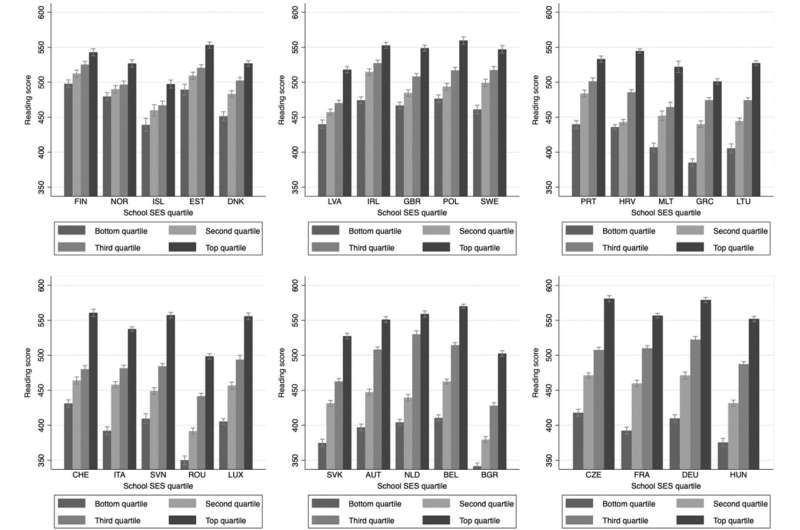This article has been reviewed according to Science X's editorial process and policies. Editors have highlighted the following attributes while ensuring the content's credibility:
fact-checked
trusted source
proofread
Irish secondary schools among the most socio-economically equal for reading literacy

Irish secondary schools are among the most socially integrated in Europe when it comes to reading literacy, according to a new cross-country comparative study led by a sociologist at Trinity College Dublin.
The study also found that a school's socio-economic composition has an impact on a child's individual reading literacy scores even after adjusting for the students' own family background. This is largely due to classroom discipline, teacher support, and peer academic aspirations.
The importance of a school's socio-economic composition for academic performance has long been documented but the exact reasons why children tend to achieve better academic results in schools with more privileged student intake has been poorly understood to date.
To better understand this phenomenon sociologist Yekaterina Chzhen, Assistant Professor at the Department of Sociology, analyzed data from 29 European countries from the OECD's 2018 Program for International Student Assessment (PISA). The study, titled "Why does school socio-economic composition matter to adolescents' academic performance? Role of classroom climate and school resources," was recently published in the British Educational Research Journal.
Dr. Chzhen and Julia Leesch, Ph.D. candidate, found that children at schools with a higher proportion of socio-economically privileged students scored higher in reading literacy in every country, but the gap between privileged and underprivileged schools varied considerably from country to country. Irish secondary schools were among the most socio-economically equal with respect to literacy scores between privileged and underprivileged schools.
Yekaterina Chzhen, Assistant Professor at the Department of Sociology, explained, "Our study found that Ireland had some of the smallest school composition gaps in Europe, alongside Scandinavian and Baltic countries. Schools in France, Germany and Hungary had the greatest differences in literacy scores between privileged and underprivileged schools.
"Overall, we found that countries that filter children into different educational tracks early, like Germany, tend to have greater differences in children's skills achievement due to school composition than countries that separate children later in adolescence, like Ireland."
A further analysis of OECD data from six countries, including Ireland, that sort children into different academic and vocational tracks after the age of 15 found that classroom climate and teaching practices were the most important factors in explaining why school social composition matters to children's PISA reading scores.
Dr. Chzhen, added, "We expected school resources such as teacher numbers, labs, computers, and physical infrastructure would matter the most. But we found that supportive teachers and motivated classmates with high aspirations played a greater role in explaining why school social composition impacts on reading literacy, even after the student's own family background is already accounted for."
More information: Yekaterina Chzhen et al, Why does school socio‐economic composition matter to adolescents' academic performance? Role of classroom climate and school resources, British Educational Research Journal (2023). DOI: 10.1002/berj.3898
Provided by Trinity College Dublin




















